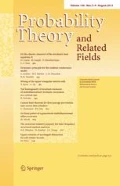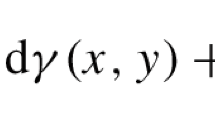Abstract
We study the potential functions that determine the optimal density for \(\varepsilon \)-entropically regularized optimal transport, the so-called Schrödinger potentials, and their convergence to the counterparts in classical optimal transport, the Kantorovich potentials. In the limit \(\varepsilon \rightarrow 0\) of vanishing regularization, strong compactness holds in \(L^{1}\) and cluster points are Kantorovich potentials. In particular, the Schrödinger potentials converge in \(L^{1}\) to the Kantorovich potentials as soon as the latter are unique. These results are proved for all continuous, integrable cost functions on Polish spaces. In the language of Schrödinger bridges, the limit corresponds to the small-noise regime.
Similar content being viewed by others
Notes
We mention that [19] uses the term Schrödinger potentials for \(f_{\varepsilon }/\varepsilon ,g_{\varepsilon }/\varepsilon \) in the Schrödinger bridge context, as is natural when no parameter \(\varepsilon \) is present. On the other hand, calling \(f_{\varepsilon },g_{\varepsilon }\) potentials is more convenient in our setting, well motivated by the connection with Kantorovich potentials in Theorem 1.1, and consistent with the terminology in [17].
I.e., \(I^{*}\) is the (a.s. unique) measurable function satisfying \(I^{*}\ge I_{\lambda }\) a.s. for all \(\lambda \) and \(I^{*}\le J\) a.s. for any J satisfying \(J\ge I_{\lambda }\) a.s. for all \(\lambda \). In other words, \(I^{*}\) is the supremum in the lattice of measurable functions equipped with the a.s. order.
References
Agueh, M., Carlier, G.: Barycenters in the Wasserstein space. SIAM J. Math. Anal. 43(2), 904–924 (2011)
Berman, R.J.: The Sinkhorn algorithm, parabolic optimal transport and geometric Monge–Ampère equations. Numer. Math. 145(4), 771–836 (2020)
Bernton, E., Ghosal, P., Nutz, M.: Entropic optimal transport: geometry and large deviations. Preprint arXiv:2102.04397v1 (2021)
Beurling, A.: An automorphism of product measures. Ann. Math. 2(72), 189–200 (1960)
Borwein, J.M., Lewis, A.S.: Decomposition of multivariate functions. Canad. J. Math. 44(3), 463–482 (1992)
Borwein, J.M., Lewis, A.S., Nussbaum, R.D.: Entropy minimization, \(DAD\) problems, and doubly stochastic kernels. J. Funct. Anal. 123(2), 264–307 (1994)
Carlier, G.: On the linear convergence of the multi-marginal Sinkhorn algorithm. Preprint hal-03176512 (2021)
Carlier, G., Duval, V., Peyré, G., Schmitzer, B.: Convergence of entropic schemes for optimal transport and gradient flows. SIAM J. Math. Anal. 49(2), 1385–1418 (2017)
Cominetti, R., San Martín, J.: Asymptotic analysis of the exponential penalty trajectory in linear programming. Math. Program. 67(2, Ser. A), 169–187 (1994)
Conforti, G., Tamanini, L.: A formula for the time derivative of the entropic cost and applications. J. Funct. Anal. 280(11), 108964 (2021)
Csiszár, I.: \(I\)-divergence geometry of probability distributions and minimization problems. Ann. Probab. 3, 146–158 (1975)
Cuturi, M.: Sinkhorn distances: lightspeed computation of optimal transport. In: Borges, O., Button, L., Welling, M., Ghahramani, Z., Weinberger, U.Q. (eds.) Advances in Neural Information Processing Systems, vol. 26, pp. 2292–2300 (2013)
Dembo, A., Zeitouni, O.: Large Deviations Techniques and Applications, Volume 38 of Stochastic Modelling and Applied Probability. Springer, Berlin (2010). Corrected reprint of the second (1998) edition
Di Marino, S., Gerolin, A.: An optimal transport approach for the Schrödinger bridge problem and convergence of Sinkhorn algorithm. J. Sci. Comput. 85(2), 27, 28 (2020)
Föllmer, H.: Random fields and diffusion processes. In: Bold, A., Eckmann, B. (eds.) École d’Été de Probabilités de Saint-Flour XV-XVII, 1985–87. Lecture Notes in Mathematics, vol. 1362, pp. 101–203. Springer, Berlin (1988)
Föllmer, H., Gantert, N.: Entropy minimization and Schrödinger processes in infinite dimensions. Ann. Probab. 25(2), 901–926 (1997)
Gigli, N., Tamanini, L.: Second order differentiation formula on \({\rm RCD}^{*}(K, N)\) spaces. J. Eur. Math. Soc. (JEMS) 23(5), 1727–1795 (2021)
Léonard, C.: From the Schrödinger problem to the Monge–Kantorovich problem. J. Funct. Anal. 262(4), 1879–1920 (2012)
Léonard, C.: A survey of the Schrödinger problem and some of its connections with optimal transport. Discrete Contin. Dyn. Syst. 34(4), 1533–1574 (2014)
Mena, G., Niles-Weed, J.: Statistical bounds for entropic optimal transport: sample complexity and the central limit theorem. In: Wallach, H., Larochelle, H., Beygelzimmer, A., d’Aldie’-Buc, F., Fox, E., Garnett, R. (eds.) Advances in Neural Information Processing Systems, vol. 32, pp. 4541–4551 (2019)
Nutz. M.: Introduction to Entropic Optimal Transport. Lecture Notes. Columbia University (2021). https://www.math.columbia.edu/~mnutz/docs/EOT_lecture_notes.pdf
Pal, S.: On the difference between entropic cost and the optimal transport cost. Preprint arXiv:1905.12206v1 (2019)
Pennanen, T., Perkkiö, A.-P.: Convex duality in nonlinear optimal transport. J. Funct. Anal. 277(4), 1029–1060 (2019)
Peyré, G., Cuturi, M.: Computational optimal transport: with applications to data science. Found. Trends Mach. Learn. 11(5–6), 355–607 (2019)
Rüschendorf, L., Thomsen, W.: Note on the Schrödinger equation and \(I\)-projections. Stat. Probab. Lett. 17(5), 369–375 (1993)
Rüschendorf, L., Thomsen, W.: Closedness of sum spaces and the generalized Schrödinger problem. Teor. Veroyatnost. i Primenen. 42(3), 576–590 (1997)
Villani, C.: Optimal Transport, Old and New, Volume 338 of Grundlehren der Mathematischen Wissenschaften. Springer, Berlin (2009)
Author information
Authors and Affiliations
Corresponding author
Additional information
Publisher's Note
Springer Nature remains neutral with regard to jurisdictional claims in published maps and institutional affiliations.
The authors thank Guillaume Carlier, Giovanni Conforti, Soumik Pal and Luca Tamanini for helpful discussions.
MN acknowledges support by an Alfred P. Sloan Fellowship and NSF Grants DMS-1812661, DMS-2106056.
Rights and permissions
About this article
Cite this article
Nutz, M., Wiesel, J. Entropic optimal transport: convergence of potentials. Probab. Theory Relat. Fields 184, 401–424 (2022). https://doi.org/10.1007/s00440-021-01096-8
Received:
Revised:
Accepted:
Published:
Issue Date:
DOI: https://doi.org/10.1007/s00440-021-01096-8



